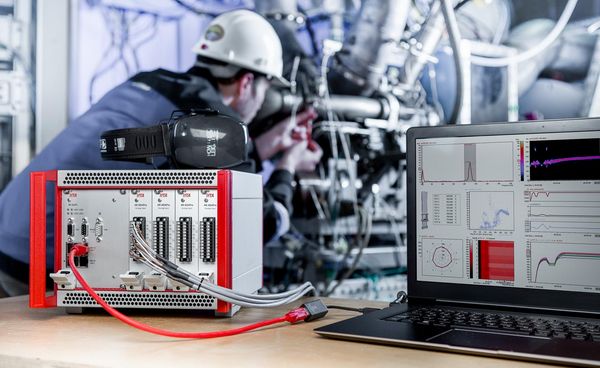Profit Increase with IFTA Systems

Process Optimization
The goal: A smooth, error-free process flow.
The mobile measurement system IFTA DynaMaster is ready-to-use for measurements, long-term monitoring and analysis. Thus, errors and sources of errors can be quickly found and eliminated with the IFTA DynaMaster.

Increased system availability and safety
The goal: The machine should run autonomously and without any interruptions as far as possible.
The IFTA ArgusOMDS monitoring system supervises systems autonomously and reliably 24/7, even over many years. The system gives warnings as soon as thresholds are exceeded. The controller can then automatically initiate sensible measures, such as a protective shutdown, so that machine damage is avoided.
Particularly in the gas turbine sector, the IFTA PreCursor early warning system provides an increased reaction time.

Energy efficiency
The goal: Fewer emissions - with the same or better performance.
Through long-term monitoring of machines and by comparing their operating data, valuable information can be obtained in order to achieve the ideal efficiency of a machine/plant. Thanks to the ideal efficiency factor, the energy consumption is lower with the same or even better performance.
By using the mobile measurement system IFTA DynaMaster in conjunction with the analysis software IFTA TrendViewer, large amounts of data can be analyzed and visualized graphically.

Increase in Profits
Predictive Maintenance
The goal: Maintenance should be condition-oriented and predictable, i.e. components should remain in place as long as possible in order to make full use of their operating life. Early signs of wear should be detected in advance.
The monitoring system IFTA ArgusOMDS supervises systems autonomously and reliably 24/7, even over years. The system provides warnings in the event of a change in the behavior of the machine. This way, critical components can be replaced in time and in a planned manner.
Profit Increase By Condition Monitoring
Condition monitoring...
- ...prevents unscheduled machine downtimes
Through permanent monitoring, damage is detected early and expensive unscheduled machine downtime and/or the complete failure of components can be prevented in advance.
- ...enables predictive maintenance (condition-oriented maintenance)
Conventional maintenance according certain intervals often means that components are replaced preventively and their remaining operating time is not used in full. By constantly monitoring the condition of components, however, operating life of critical system components can be fully exploited. Necessary repair measures can be coordinated with the production plan. These two factors ensure considerable cost savings.
- ...ensures a reliable faultless function of production plants
Through constant monitoring and corresponding analysis of the recorded data, conclusions can be made for further optimization of the production facilities. This allows the identification of possible optimizations by performing a correlation analysis of components and thus avoiding critical vibrations.


Understanding Vibrations and Working Profitably
IFTA analysis, monitoring and protection systems can be used to reduce costs e.g. through process optimization, fault finding, time saving, lower energy costs and optimized machine utilization. How this can be achieved in concrete terms naturally depends on the objectives and individual circumstances of our customers.
We are happy to support you in filtering valuable information from your vibration data, understanding these information and being profitable for your company.
